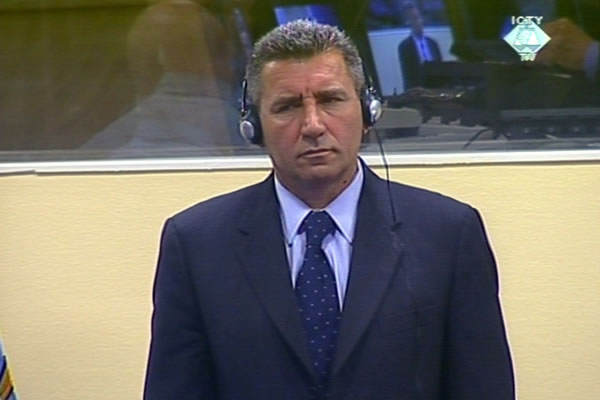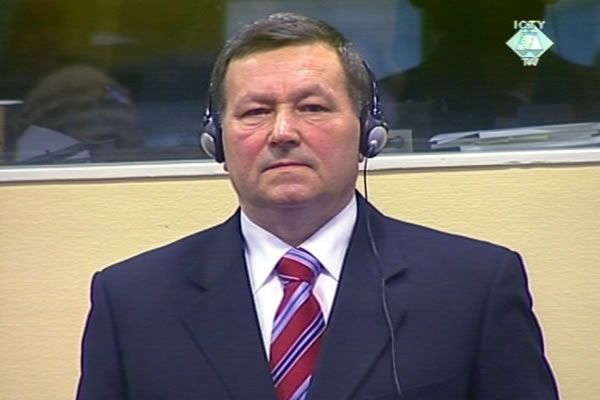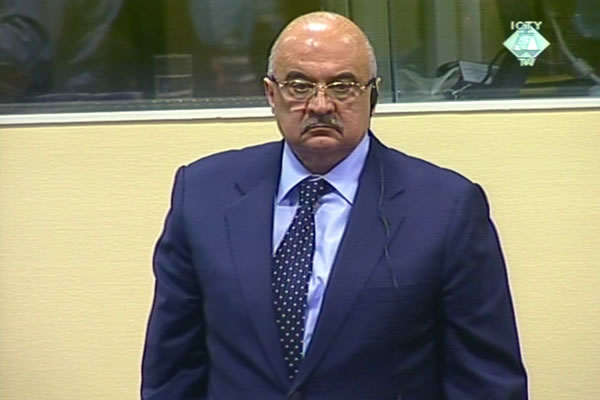Home
GOTOVINA SENTENCED TO 24 YEARS, MARKAC TO 18, CERMAK WALKS FREE
Croatian generals Ante Gotovina and Mladen Markac were today convicted as participants of the joint criminal enterprise headed by former president Franjo Tudjman. The judges found that Ivan Cermak didn’t contribute to the crimes against Serbs in Krajina during and after Operation Storm
 Ante Gotovina in the courtroom
Ante Gotovina in the courtroom In the summer of 1995, there existed a joint criminal enterprise in Croatia, headed by President Franjo Tudjman. Its objective was the permanent removal of the Serb population from the Krajina region, concluded the Trial Chamber with Dutch judge Orie presiding. The judgment for the crimes during and after Operation Storm was handed down today at the Tribunal. The judges found that the joint criminal enterprise involved the then defense minister Gojko Susak, Chief of the HV Main Staff Zvonimir Cervenko and other high-ranking political, military and police officials. Among them were the two accused – the Split Military District commander Ante Gotovina and the special police commander Mladen Markac, but not the commander of the Knin Garrison Ivan Cermak.
The Trial Chamber found the two accused guilty of eight out of the nine counts in the indictment, charging them with persecution, deportation, looting and destruction of property, murder, inhumane acts and cruel treatment. Gotovina was sentenced to 24 years and Mladen Markac to 18 years in prison. Ivan Cermak was acquitted of all charges and will be released. Gotovina will receive credit for the five years and four months he has already spent in the UN Detention Unit and Markac for a little over four years.
The Trial Chamber found that during the artillery attack on Knin, Benkovac, Gracac and Obrovac on 4 and 5 August 1995, the shells hit not only the pre-determined military targets but also civilian areas. This constituted an indiscriminate and unlawful attack on the civilian population. The judgment notes that the order of the Krajina authorities for the evacuation of civilians of 4 August 1995 was taken into consideration, but the judges concluded that it had ‘little or no’ influence on the Serbs’ decision to leave Krajina. The main reason why they left was fear of violence that resulted from the indiscriminate shelling of the towns and other crimes, like murder, looting, arson and inhumane acts committed by the Croatian Army and the special police. ‘Those crimes contributed to an environment in which the Krajina Serbs had no other choice but to flee’, the Trial Chamber concluded.
When the Serb civilians left Krajina, the Croatian authorities issued a series of ‘legal instruments’ to prevent them from returning, the summary of the judgment says. The goal was to make sure that the property the Krajina Serbs left behind would end up in the hands of the Croats. According to the judges, this was a discriminatory measure that constituted persecution. The Chamber also found that the Croatian Army soldiers and the special police killed several people in the Krajina area. Among the murders are those of an old woman and her sick son in the village of Mokro Polje, the execution of five men in the village of Ocestovo and of several elderly persons in the village of Grubori. The army and police personnel are held responsible for the plunder and destruction of abandoned Serb property and for the deportation and inhumane treatment of Krajina inhabitants.
Colonel General Ante Gotovina commanded all those units. Gotovina was involved in the preparations for Operation Storm at the meeting of President Tudjman and the state and military leadership in Brijuni on 31 July 1995. This was one of key events in the judges’ decision about the existence of the joint criminal enterprise. The judgment notes that Gotovina contributed significantly to the implementation of the joint criminal enterprise by ordering unlawful attacks on civilians and not doing anything to prevent crimes and punish the perpetrators. This created an environment in which crimes were acceptable.
The situation is similar in Mladen Markac’s case, although he commanded just a part of the forces that took part in Operation Storm: the special police units. Those units participated in the indiscriminate shelling of Gracac, the murder of several elderly people in the village of Grubori and the looting and destruction of Gracac and Donji Lapac. The judges considered the large number of crimes in a wide geographical area, the vulnerability of the victims, and the abuse of the position of authority as aggravating circumstances for both Gotovina and Markac. Mitigating circumstances were Markac’s health and Gotovina’s good behavior in the detention unit and in the courtroom.
Ivan Cermak was acquitted of all counts in the indictment. The Trial Chamber ruled that Cermak’s duties in the liberated territory were primarily of civilian nature: he liaised with the international observers and made sure that life in Knin could go back to normal. Although they find that Cermak had ‘some influence’ over the army and the police, the prosecution evidence was not sufficient to convince the judges that Cermak was their superior. The summary of the judgment says that the evidence shows that in late August 1995 Cermak ‘denied and concealed’ the crime in the village of Grubori, but the Trial Chamber was ‘not convinced that Cermak gave false assurances’ to the international representatives that the crimes against Serbs would cease.
After the judgment was delivered, there were just a few sighs and muttered words of disapproval in the public gallery, but no major incidents.
Photos
Linked Reports
- Case : Gotovina et al. - "Operation Storm"
- 2011-03-22 GOTOVINA DOESN’T WANT THE EUROPEAN MONITORS’ REPORTS TO REMAIN UNDER SEAL
- 2011-03-18 PUBLIC ASPECT OF CONFIDENTIAL DOCUMENTS
- 2011-03-14 JUDGMENT FOR CROATIAN GENERALS DUE ON 15 APRIL
- 2011-04-18 BRIONI TRANSCRIPTS ANALYZED
- 2011-04-19 TUDJMAN’S ATTITUDE TO SERBS
- 2011-04-20 DISCRIMINATORY LAWS AFTER THE OPERATION STORM


